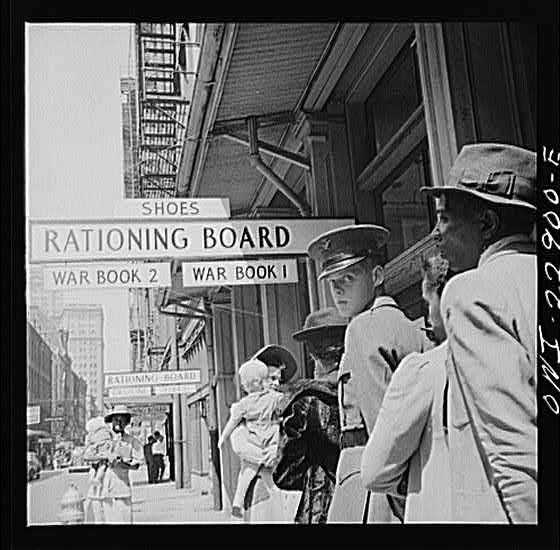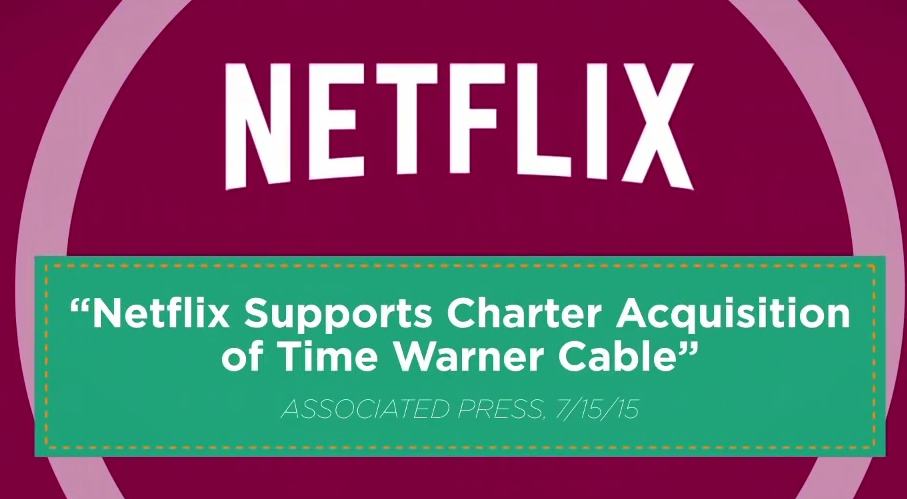 Ricardo Bolán was not happy while reading his latest Comcast bill informing him he was about to be included in Comcast’s creeping trial of usage caps, which has slowly spread across the cable company’s service areas in the south and western U.S.
Ricardo Bolán was not happy while reading his latest Comcast bill informing him he was about to be included in Comcast’s creeping trial of usage caps, which has slowly spread across the cable company’s service areas in the south and western U.S.
“Customer service said we were one of the communities ‘opting in’ to Comcast’s data usage plan, which is their way of saying Comcast forced it on us,” said Bolán, who lives in Hialeah, Fla.
Several South Florida customers are writing Stop the Cap! to complain about Comcast’s Oct. 1 imposition of a 300GB usage cap on its broadband service. Customers exceeding their allowance will now pay $10 in overlimit fees for each 50GB increment.
“Comcast’s usage meter hasn’t reliably worked down here for weeks, so you are flying blind over how much data you are using, and we’re talking about Comcast, so who can trust them?,” said Dave — a Stop the Cap! reader in Miami Beach. “I guess it’s back to AT&T.”
When the usage tool does work, some customers claim their reported usage levels suddenly doubled or tripled after Comcast’s usage cap started.
 “Since this new data plan trial for Florida went into effect, I decided to check my usage,” Batchman27 wrote on Comcast’s support forum. “I am at 11GB in one day. I looked back at my usage for the past three months (July 1-Sept 30) and my average for those 92 days was 5.86GB per day. I find it very odd and extremely convenient that my usage [nearly doubled] on the day this ‘trial’ began.”
“Since this new data plan trial for Florida went into effect, I decided to check my usage,” Batchman27 wrote on Comcast’s support forum. “I am at 11GB in one day. I looked back at my usage for the past three months (July 1-Sept 30) and my average for those 92 days was 5.86GB per day. I find it very odd and extremely convenient that my usage [nearly doubled] on the day this ‘trial’ began.”
Over the next several days, his usage stayed consistently at or above 11GB a day.
“At this rate, I will exceed the 300GB before the end of the month and will be billed for the additional blocks of data (note: my highest usage during those three months was 202GB in August),” he added.
Another customer has had to banish Netflix, Hulu, and all other subscription video services from his home because they make all the difference whether or not his family of four will face overlimit bill charges and bill shock from Comcast.
“It’s no surprise what they are targeting with these caps,” said Austin Chilson. “If you watch Netflix or Hulu on a regular basis, 300GB is not enough. Netflix alone is responsible for about 17GB of video usage during the first three days of the month, and we were gone most of the day on Saturday the 3rd.”
Another customer echoes Chilson.
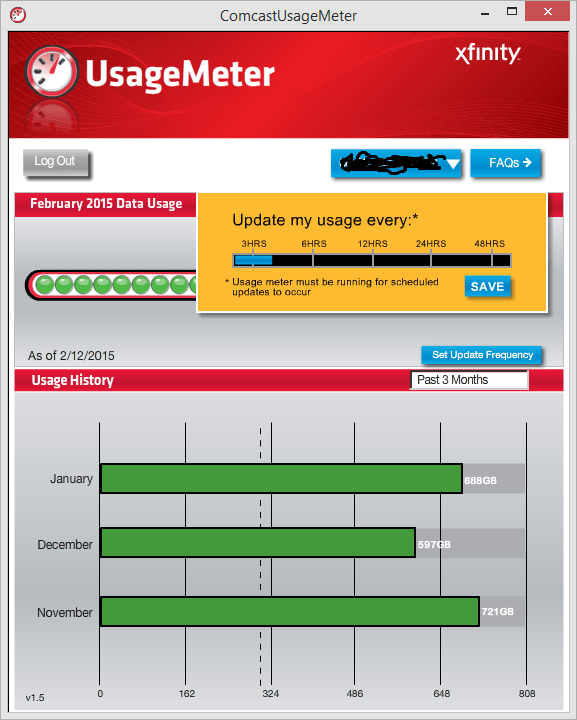 “I feel like we’re a pretty average family of four,” GuitarManJonny wrote Oct. 2 on Comcast’s support forum. “Of course we stream Netflix and we do a little downloading although nothing approaching what I’d consider excessive (no torrents, for example) and I have gone over the limit every month since July. I’m already at 13GB for this month, so it’s a pretty safe bet that I will go over again.”
“I feel like we’re a pretty average family of four,” GuitarManJonny wrote Oct. 2 on Comcast’s support forum. “Of course we stream Netflix and we do a little downloading although nothing approaching what I’d consider excessive (no torrents, for example) and I have gone over the limit every month since July. I’m already at 13GB for this month, so it’s a pretty safe bet that I will go over again.”
Florida customers have an option other Comcast customers do not — a way back to unlimited usage by paying an extra $30 for an “unlimited use option.”
That seemed to only infuriate customers more.
“It’s amazing that a cap is being turned on and yet I’m asked to pay the same amount that I have been for unlimited and then being asked to pay MORE to continue the same plan I’m on now,” writes Gldoori. “It’s also ironic that I get the ‘We’re sorry. We can’t load your Internet usage meter right now’ [error message] when I try to monitor my usage on the website.”
“I’ll be cancelling my TV and home phone with them in a couple of months when my plan expires and then dropping my Internet speed to fit a “need” rather than a “want,” Gldoori wrote. “I’m not paying $30 more (for unlimited) just to have the same Internet plan I’ve been paying for already.”
A Comcast spokesperson tried to defend the implementation of usage caps in Miami-Dade, Broward and the Florida Keys by suggesting almost none of their customers will be impacted by it.
“To put things in perspective, 300 GB is an extremely large amount of data to use,” Comcast Florida spokeswoman Mindy Kramer told the Miami Herald. “The median data use for our customers is 40GB per month; about 70 percent of our customers use less than 100GB per month. About 92 percent of our customers will see absolutely no impact on their monthly bills.”
Kramer claims the new usage caps are about fairness.
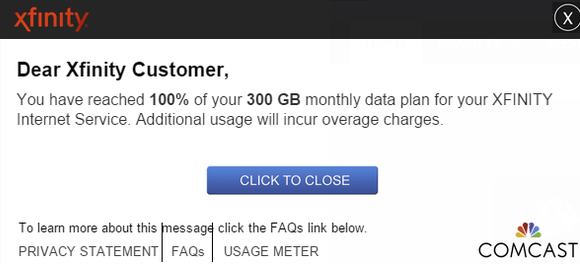 “Our data plan trials are part of our ongoing effort to create a fair, technologically-sound policy in which customers who use more data pay more, and customers who use less pay less,” Kramer said.
“Our data plan trials are part of our ongoing effort to create a fair, technologically-sound policy in which customers who use more data pay more, and customers who use less pay less,” Kramer said.
Except no customers are paying less. Comcast’s broadband rates have not changed as a result of the market trials, only a usage cap was introduced.
In other cities living under Comcast’s usage caps, the first notice many customers take of the new caps comes in the form of a much higher bill. Clark Howard, a consumer reporter for WSB-TV in Atlanta, has heard from local residents reporting serious bill spikes if they ignored Comcast’s warning or failed to curtail their usage.
Another reader in South Florida reports Comcast does inform Floridians when their usage allowance runs out, including automated phone calls and a browser-injected warning message appearing on all non-https websites when a customer reaches 80 and 100% of their monthly allowance. Once that allowance is exceeded, your Internet will not stop working. Comcast will instead add $10 for each additional 50GB you use until the end of your billing cycle.
 “There is no way to opt out of accruing overlimit fees and when the usage tool is down, you have no idea what your bill will look like,” said Bolán. “To keep this in perspective, if you manage to use 500GB in a month, the overlimit fee will add $40 to your bill. If you cut your cable TV and watch Hulu and Netflix, that kind of usage is not surprising.”
“There is no way to opt out of accruing overlimit fees and when the usage tool is down, you have no idea what your bill will look like,” said Bolán. “To keep this in perspective, if you manage to use 500GB in a month, the overlimit fee will add $40 to your bill. If you cut your cable TV and watch Hulu and Netflix, that kind of usage is not surprising.”
Chilson’s parents have been impacted by Comcast’s usage caps in another way — they are having trouble selling their home because Comcast is the only service provider. AT&T isn’t providing U-verse service to several homes on the street, including theirs.
“The realtor reports would-be buyers are shying away because they don’t like the Internet options, which are Comcast, Comcast, or Comcast,” Chilson said. “My parents have offered to split closing costs and even tried lowering the price, but because everyone hates Comcast, they just don’t want to be stuck living in a home with Comcast as their only choice.”
Chilson suggested offering would-be buyers $720 — the cost of two years of Comcast’s $30 a month unlimited add-on plan. Still no takers, and several buyers cited Internet availability and Comcast as reasons for backing away.
Jerome Stokes of Palm Springs, Fla. has managed to collect almost 2,000 signatures on his Change.org petition demanding Comcast remove the usage caps from all of their Internet plans. He calls data caps “barbaric,” and thinks they should be illegal. Other customers are also complaining to the FCC.
Sean Miranda thinks they are just bad for business:
“If this doesn’t affect most people anyway, why bother implementing this change? All it does is make people like myself, less inclined to continue using your service, and instead switch to a different ISP that doesn’t put such silly restrictions on their customers. AT&T is starting to look better and better right about now, but where do I go once they start implementing this too, huh? I want no involvement in this “trial” and hope you discontinue this monopoly scheme immediately, or I will have no choice but to take my business elsewhere or to create new competition.”
 How dare you use Hulu to watch current episodes of your favorite TV shows?
How dare you use Hulu to watch current episodes of your favorite TV shows?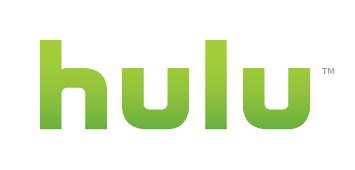 Some on Wall Street think Time Warner’s argument has merit, noting streaming services’ growing libraries of popular television shows and movies makes consumers more likely to consider dropping bloated cable and satellite packages.
Some on Wall Street think Time Warner’s argument has merit, noting streaming services’ growing libraries of popular television shows and movies makes consumers more likely to consider dropping bloated cable and satellite packages.

 Subscribe
Subscribe Stop the Cap! has received a growing number of complaints from Comcast customers in Georgia who are paying the cable company an extra $35 a month to get back unlimited Internet access that is performing worse than ever before for online video streaming.
Stop the Cap! has received a growing number of complaints from Comcast customers in Georgia who are paying the cable company an extra $35 a month to get back unlimited Internet access that is performing worse than ever before for online video streaming.
 Jeff Wemberly reports his Comcast usage meter is recording unprecedented levels of usage he has never seen on his broadband account before the caps.
Jeff Wemberly reports his Comcast usage meter is recording unprecedented levels of usage he has never seen on his broadband account before the caps. Ricardo Bolán was not happy while reading his latest Comcast bill informing him he was about to be included in Comcast’s creeping trial of usage caps, which has slowly spread across the cable company’s service areas in the south and western U.S.
Ricardo Bolán was not happy while reading his latest Comcast bill informing him he was about to be included in Comcast’s creeping trial of usage caps, which has slowly spread across the cable company’s service areas in the south and western U.S. “Since this new data plan trial for Florida went into effect, I decided to check my usage,” Batchman27 wrote on Comcast’s support forum. “I am at 11GB in one day. I looked back at my usage for the past three months (July 1-Sept 30) and my average for those 92 days was 5.86GB per day. I find it very odd and extremely convenient that my usage [nearly doubled] on the day this ‘trial’ began.”
“Since this new data plan trial for Florida went into effect, I decided to check my usage,” Batchman27 wrote on Comcast’s support forum. “I am at 11GB in one day. I looked back at my usage for the past three months (July 1-Sept 30) and my average for those 92 days was 5.86GB per day. I find it very odd and extremely convenient that my usage [nearly doubled] on the day this ‘trial’ began.” “I feel like we’re a pretty average family of four,” GuitarManJonny wrote Oct. 2 on Comcast’s support forum. “Of course we stream Netflix and we do a little downloading although nothing approaching what I’d consider excessive (no torrents, for example) and I have gone over the limit every month since July. I’m already at 13GB for this month, so it’s a pretty safe bet that I will go over again.”
“I feel like we’re a pretty average family of four,” GuitarManJonny wrote Oct. 2 on Comcast’s support forum. “Of course we stream Netflix and we do a little downloading although nothing approaching what I’d consider excessive (no torrents, for example) and I have gone over the limit every month since July. I’m already at 13GB for this month, so it’s a pretty safe bet that I will go over again.” “Our data plan trials are part of our ongoing effort to create a fair, technologically-sound policy in which customers who use more data pay more, and customers who use less pay less,” Kramer said.
“Our data plan trials are part of our ongoing effort to create a fair, technologically-sound policy in which customers who use more data pay more, and customers who use less pay less,” Kramer said. Less than three months before announcing it would acquire Time Warner Cable in a $55 billion deal, Charter Communications quietly dropped usage caps, in place on its broadband plans since 2009, without explanation and the FCC wants to know why.
Less than three months before announcing it would acquire Time Warner Cable in a $55 billion deal, Charter Communications quietly dropped usage caps, in place on its broadband plans since 2009, without explanation and the FCC wants to know why.
